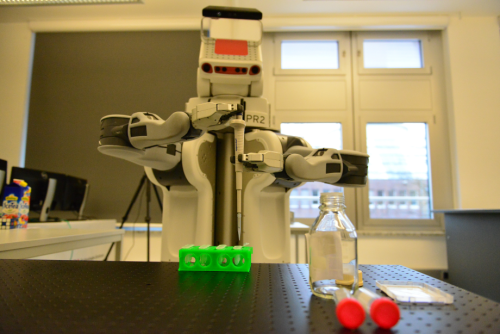ACAT
Learning and Execution of Action Categories
The aim of ACAT is to provide artificial systems with abstract, functional knowledge about relationships between action objects from information sources made for humans. The potential of robots would be greatly expanded if they could utilize the incredible amount of knowledge available to humans. However, most of these sources of information assume common knowledge that does not need to be explicitly specified when interpreted by humans. ACAT provides robots with this type of information and generates internal knowledge about tasks by creating and storing all required action information into “action categories”. This is done by generating dynamic process memory by extracting and storing action categories from large text and image sources.
Action categories are designed to include both action encoding and context information obtained by combining linguistic analysis with indepth exploration and action simulation. The strength of action categories is that the rich contextual information allows for generalization (for example replacing objects in an action) and addresses ambiguity and incompleteness in planning.
An example industrial application for ACAT would be to use manuals made for human workers to create instructions executable by robots. This would enable the robot to do certain human tasks without time-consuming programming procedures. The result of the ACAT project is a robot compiler which translates human-understandable information into a program that a robot can execute.
Our role within the project is to build an action verb-specific knowledge base using first-order statistical representation, learning, and reasoning and to create an ontology of action categories. We will also coordinate the project's planning and execution module and design and implement extensions to the Cognitive Robot Abstract Machine (CRAM) for concurrent reactive plan execution.
For more information and news, visit at www.acat-project.eu
Partners:
Prof. Dr. hc. Michael Beetz PhD
Head of Institute
Contact via
Andrea Cowley
assistant to Prof. Beetz
ai-office@cs.uni-bremen.de
Discover our VRB for innovative and interactive research

Memberships and associations:









![Logo_komplett_r_vekt_Farbe Kopie [Konvertiert] Logo_komplett_r_vekt_Farbe Kopie [Konvertiert]](/_media/projects/acat/logos/uglogo.jpg?w=300&tok=d5e1eb)







